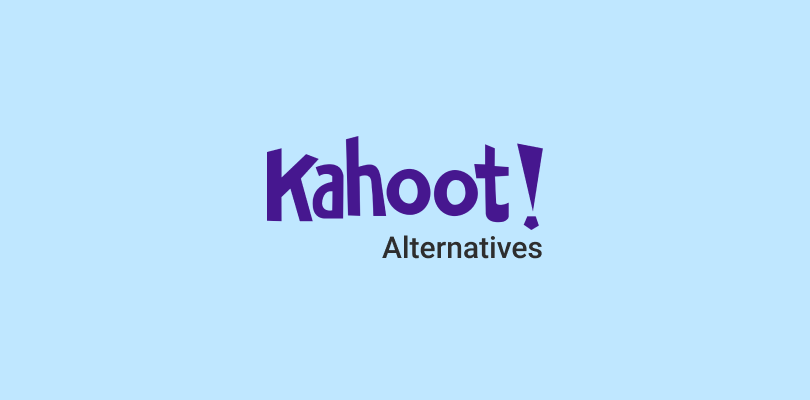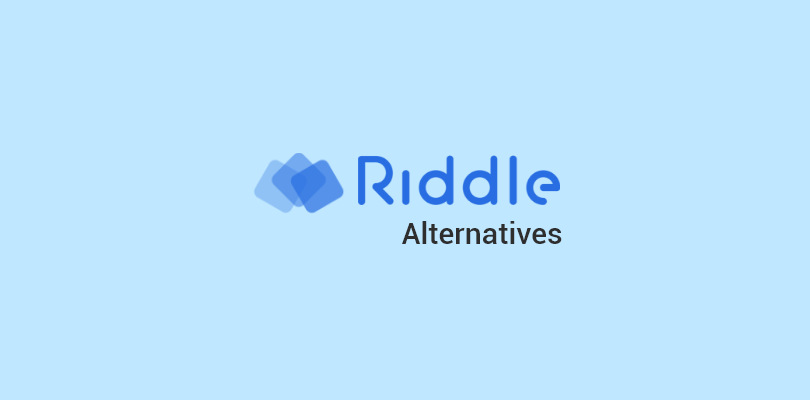ClassMarker has been a go-to platform for online tests. It’s straightforward and reliable, which is why many educators and trainers start with it. But as testing needs evolve—whether it’s AI-powered quiz creation, interactive formats, or in-depth analytics—instructors begin looking for ClassMarker alternatives that can do a bit more.
From what I’ve seen, the best ones build on the foundation ClassMarker provides but add the flexibility it lacks. They make quiz creation faster, the experience more engaging, and the insights deeper—all without complicating setup or compromising test integrity.
In this blog post, I’ve rounded up ten ClassMarker competitors that stand out for different reasons, from secure exam delivery to gamified learning and data-rich analytics.
Before we look at them, let’s explore a bit more about why people switch from ClassMarker.
Why Look Beyond ClassMarker
ClassMarker is widely used for online testing in education and corporate training, but several challenges make users search for better-suited alternatives:
- Subscription & Credit Costs: Aside from a limited free tier for educators, getting full use of ClassMarker’s features requires a paid plan and often purchasing test-taking credits. This pricing structure can become costly or confusing for small organizations with many test-takers.
- Limited Free Plan: The free version (available only for non-profits/education) is constrained – for instance, it allows only basic question types and around 100 tests per month. Advanced features like extensive question banks, branching scenarios, or certain question types require upgrading to a paid plan.
- No Gamified or Live Options: ClassMarker delivers static quizzes for on-demand use. It doesn’t include built-in gamified modes, live competition, or team-based play, so engagement can dip compared to more interactive platforms. There’s no way to run a live quiz game or collaborative challenge within ClassMarker.
- Basic Analytics: While ClassMarker provides score reports and exports, it lacks the kind of real-time dashboards and in-depth analytics some alternatives offer. You won’t get instantaneous item-by-item insight or tracking of student performance over a period without manual work.
- Integration and Content Limits: Beyond publishing test results or using an API, ClassMarker has fewer direct integrations with classroom or corporate tools (e.g., Google Classroom, Microsoft Teams) and no large public library of ready-made quizzes. You must create most content from scratch and handle sharing results largely on your own.
- Limited Customization: ClassMarker’s interface is functional but offers minimal branding or theme options. Tests have a one-size-fits-all look and feel that you can’t deeply customize. For organizations wanting a modern, branded exam experience, this lack of customization is a drawback.
Best ClassMarker Alternatives for Quizzes & Exams
Here’s a look at some of the best ClassMarker alternatives available today. Each option brings distinct strengths—locked-down testing, playful game modes, AI quiz creation, or group-based instruction.
| Tool | Best For | Pricing |
|---|---|---|
| ProProfs Quiz Maker | AI-powered quizzes and secure assessments | Free for short quizzes; paid plans start at $19.99/month |
| FlexiQuiz | Monitored online exams | Plans start at $17/month |
| Kahoot! | Live, competitive quiz games | Free plan; paid plans from $7.99/host/month |
| Testportal | Skills testing and compliance training | Free plan; paid plans from $35/month |
| Exam.net | High-security academic testing | Custom pricing; 75-day free trial for schools |
| Wayground (Quizizz) | Student-paced learning and homework quizzes | Free plan; business plans from $75/month |
| Pear Assessment (Edulastic) | Standards-aligned classroom assessments | Free plan; paid plans start at $125/year |
| Classtime | Collaborative classroom quizzes | Free plan; paid plans start at $5/teacher/month |
| Google Forms | Basic free quizzes and surveys | Free with Google account; included in Google Workspace ($6+) |
| Riddle | Personality and marketing quizzes | No free plan; paid plans start at $59/month |
1. ProProfs Quiz Maker — Best for AI-Powered Quizzes & Secure Assessments
I’ve relied on ProProfs Quiz Maker for everything from onboarding sessions to compliance exams and ongoing employee training. What stands out is how efficiently it blends speed with depth.
Its AI quiz generator can create full assessments or question sets in moments, and when I want something more comprehensive, there’s an enormous library with over 100,000 templates, 200+ prebuilt skill tests, and a million-plus ready-to-use questions.
It also keeps quizzes engaging with 20+ interactive question types, including video, audio, drag-and-drop, and hotspot options. Automated grading and instant feedback eliminate repetitive admin work, while advanced reporting lets me monitor results across teams, classes, or departments.
In practice, it’s proven dependable for both small knowledge checks and large-scale proctored exams. Security settings like randomized questions, browser lockdown, access restrictions, and AI-driven webcam and screen proctoring ensure tests stay fair and tamper-proof.
Pros:
- AI question generator creates quizzes from documents, text, or prompts, saving hours of prep.
- 100,000+ templates and a million ready-to-use questions for instant quiz content.
- Supports 20+ question types, including advanced formats like drag-and-drop, hotspot, and video responses.
- Detailed reports and analytics to track performance at class, group, or individual levels.
- Enterprise-ready features: question randomization, browser lockdown, automated proctoring, and other anti-cheating settings.
Cons:
- No dark mode in the interface, which could affect comfort during extended quiz building or taking sessions.
- Fully cloud-based without an offline or on-premise version, so you need an internet connection to take quizzes.
How ProProfs Quiz Maker Compares to ClassMarker:
ClassMarker is a solid exam delivery tool, but it lacks some of the flexibility ProProfs provides. ProProfs Quiz Maker offers extras like AI-based quiz creation and built-in proctoring that ClassMarker doesn’t have. It’s also entirely web-based (no external add-ins needed) and includes far more ready-made content and question formats. This makes ProProfs a more versatile choice when you need to create quizzes quickly and ensure test integrity at scale.
Pricing: Free for short quizzes with all essential features. Paid plans start at $19.99/month for longer assessments and advanced security.
User Rating: 4.5/5 (Capterra)
2. FlexiQuiz — Best for Monitored Online Exams
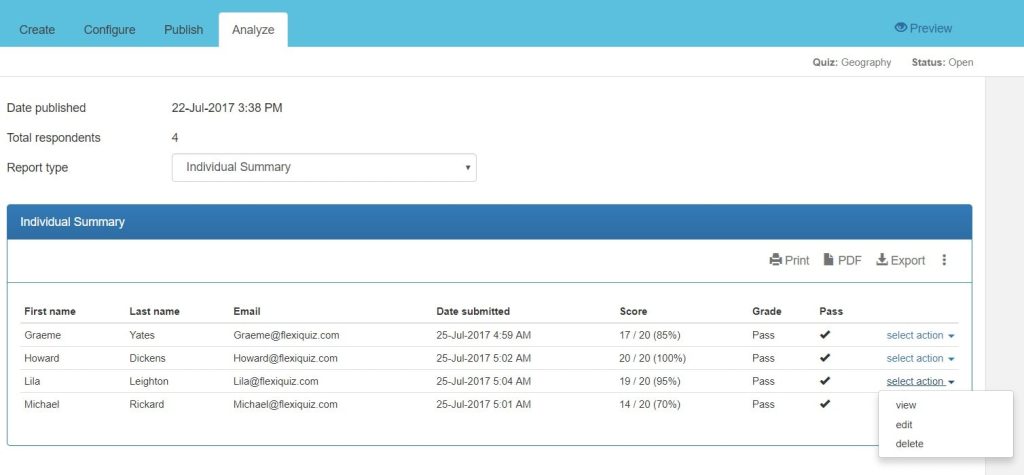
Image source: FlexiQuiz
FlexiQuiz functions as a practical ClassMarker alternative for developing, deploying, and overseeing online evaluations in both academic and corporate settings. It accommodates a wide range of question types, including multiple-choice, essays, file uploads, and matching, giving you flexibility for everything from quick knowledge checks to formal exams.
You can also set up timers, arrange for question order to be randomized, and build multi-page tests with branching logic for more customized assessments.
What makes the platform useful is its pairing of simple test creation with solid delivery controls. Security features like password protection, private test links, and browser lockdown help maintain integrity, while live invigilation capabilities enable proctors to monitor participants in real time.
When I ran a mock test, the instant results were detailed and exportable, which made it easy to analyze responses and share outcomes. FlexiQuiz also connects with systems like Moodle, WordPress, and Zapier, so it fits into existing digital learning workflows without much trouble.
Pros:
- Supports 20+ question types, including open-ended essays and file upload responses.
- Security features such as password-protected exams, question randomization, and a built-in browser lockdown mode.
- Real-time invigilation tools for live proctoring and monitoring of high-stakes exams.
- Customizable branding and the ability to issue certificates, giving a professional touch to tests.
Cons:
- Bulk importing of users or questions is a bit cumbersome, which can slow down setup for very large groups or question banks.
- The exported report files sometimes fail to clearly map data columns to specific questions when images or media are involved.
How FlexiQuiz Compares to ClassMarker:
ClassMarker enables secure testing but doesn’t offer built-in live proctoring or video monitoring. FlexiQuiz provides those oversight features out of the box, making it better suited for exams where active supervision is important. It also matches many of ClassMarker’s strengths on question variety and security while adding integrations and customization that give you more control over the test-taking experience.
Pricing: Starts at $17/month for 500 responses a month (higher tiers raise this limit).
User Rating: 4.3/5 (Capterra)
3. Kahoot! — Best for Live, Competitive Quiz Games
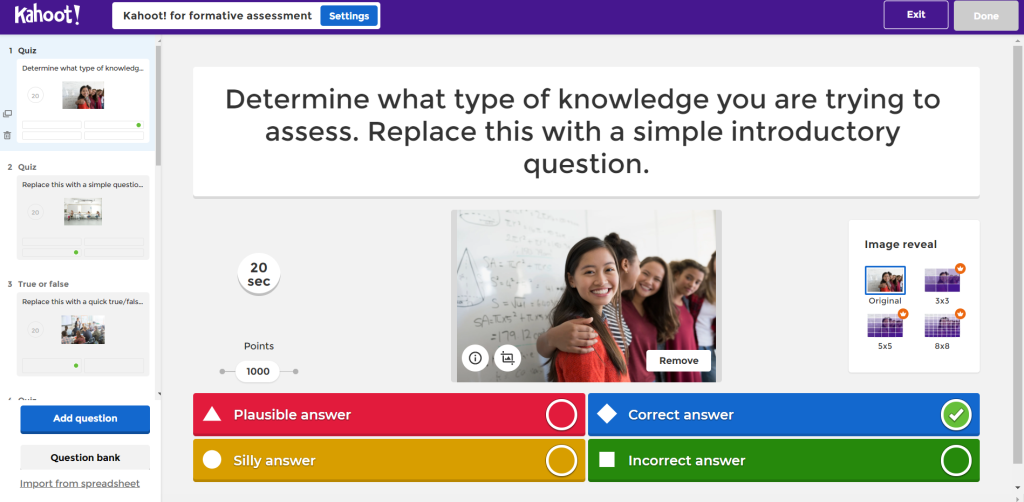
Image source: xavier.edu
Kahoot! takes standard quizzes and transforms them into live game sessions that are all about competition and group energy. I’ve personally seen it used in both workshops and classes, where the upbeat music, countdowns, and real-time leaderboards make the atmosphere feel more like a game show than a traditional test.
The platform offers a variety of ways to ask questions, including multiple-choice, true/false, polls, puzzles, and even word clouds. To make getting started easy, its public community library has millions of quizzes available across practically every subject—all you have to do is find one that fits and hit ‘play.’
While you can assign Kahoot! challenges for students to complete on their own schedule, the platform really shines in live group settings where high energy and immediate engagement are the goal. It’s the kind of tool that makes reviewing material for training or class revisions feel more like a fun contest.
Pros:
- Live gameplay with music, timers, and leaderboards to generate high engagement.
- Huge library of community-created quizzes and trivia games available for reuse.
- Supports diverse question types, including polls, puzzles, and word cloud prompts for audience input.
- Can be played in teams or individually, and also offers “challenge” mode for homework or asynchronous practice.
- Accessible in over 60 languages, with features like read-aloud and auto-translate to support different learners.
Cons:
- Reporting focuses mainly on scores and rankings, offering less detailed analysis of learning outcomes or long-term progress.
- Requires a presenter/host to run live games, which isn’t practical for self-paced testing scenarios.
How Kahoot! Compares to ClassMarker:
Kahoot! is all about lively, real-time engagement and gamification, whereas ClassMarker is about structured exam delivery and asynchronous testing. They serve very different purposes. Kahoot! has the edge when you want to energize a class or training session and reinforce learning through friendly competition – something ClassMarker doesn’t attempt to do.
Pricing: Free plan available with basic functionality. Paid plans begin from $7.99/host/month, with features scaling by audience size and customization needs.
User Rating: 4.7/5 (Capterra)
4. Testportal — Best for Skills Testing and Compliance Training
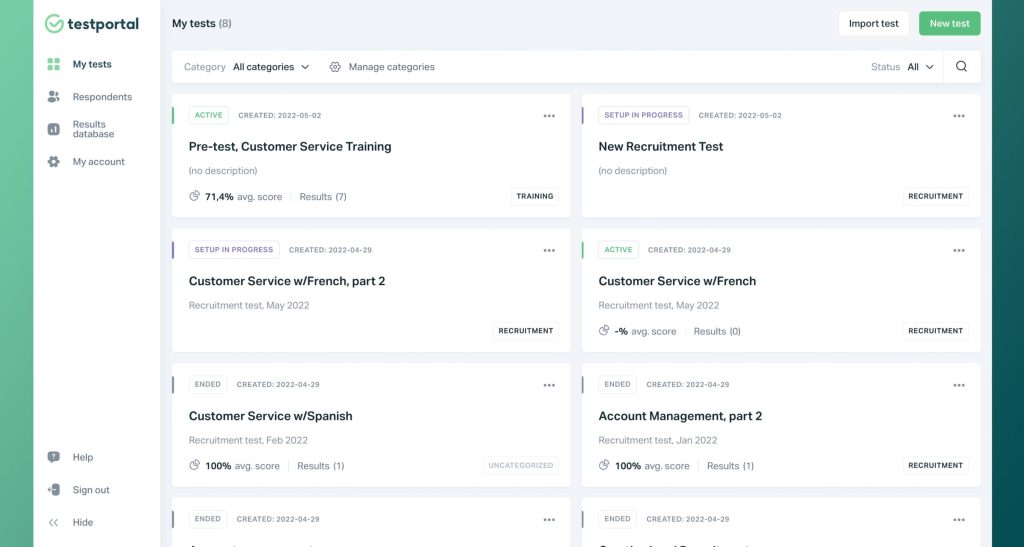
Image source: SoftwareWorld
Testportal is built specifically for structured, high-stakes assessments, not for casual quizzing. It’s widely used across education, human resources, and corporate training, where the integrity of the exam and detailed data are crucial.
The security features are one of Testportal’s major strengths. Administrators can demand access codes for every test, establish limits on time and attempts, mix up the question order, and even track exactly how long participants spend on each item. These controls effectively simulate the environment of a supervised exam hall, which is extremely useful for compliance testing or professional certification programs.
Another area where this ClassMarker alternative provides significant value is in its reporting. The platform goes beyond simple raw scores; its analytics can uncover patterns, such as which questions were missed most often and the precise duration respondents took on each one.
Furthermore, Testportal has adopted new technology by offering an AI-powered quiz generator capable of creating questions from text prompts or documents that you upload.
Pros:
- Robust security options: password protection, unique access codes, limits on test attempts, and detailed time tracking.
- Detailed reporting with insights into question difficulty, time spent, and answer distributions.
- AI-powered quiz creation from simple prompts or documents for rapidly generating test content.
- Integrates with Microsoft Teams and other education platforms, making it easier to deploy in institutional environments.
- Highly scalable for large organizations – can handle testing across schools, universities, or company departments with many participants.
Cons:
- Limited multimedia support in questions compared to some newer quiz tools (e.g., fewer options for video or interactive question types).
- The interface is more utilitarian than engaging – it’s functional but can feel dry or “all business.”
How Testportal Compares to ClassMarker:
Testportal and ClassMarker both focus on delivering secure online exams, but Testportal pushes further on analytics and control. Testportal provides built-in proctoring options and deeper data analysis that ClassMarker doesn’t offer. ClassMarker covers the basics of online testing well, but won’t give you the same depth of insight into exam results or the AI-assisted content creation that Testportal offers.
Pricing: Free plan with basic functionality. Paid plans start at $35/month, unlocking enterprise-level security settings and advanced reporting features.
User Rating: 4.6/5 (Capterra)
5. Exam.net — Best for High-Security Academic Testing
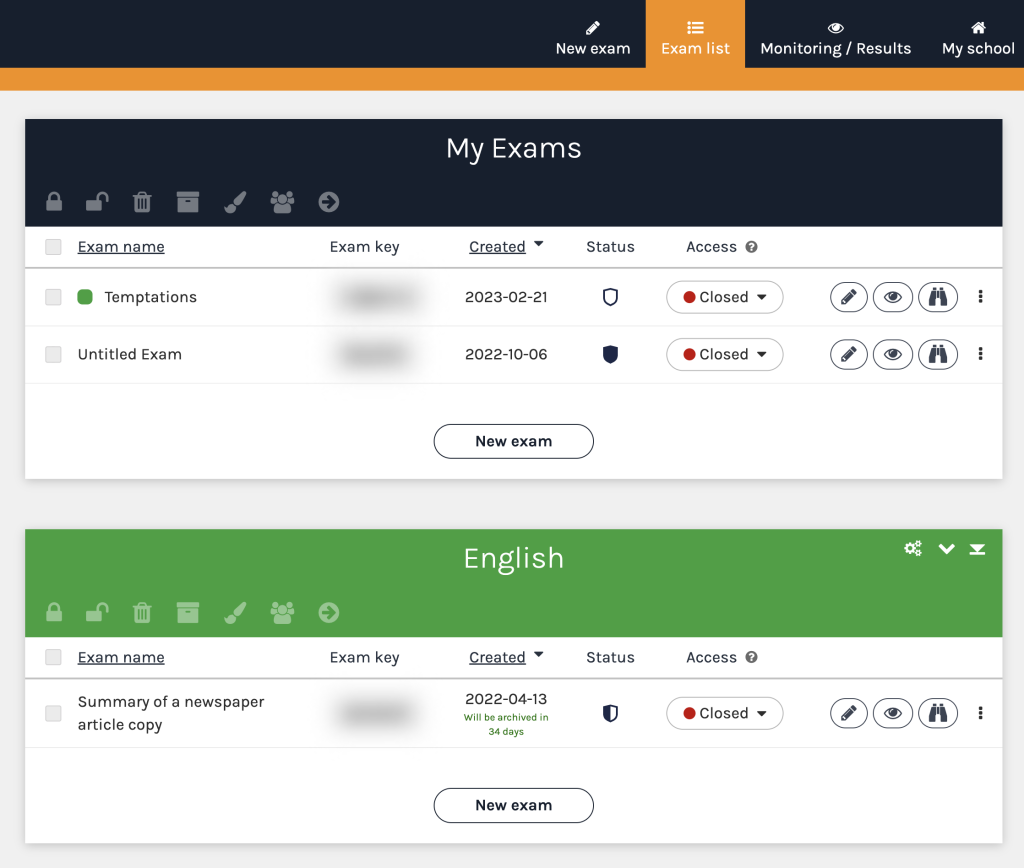
Image source: Exam.net
Exam.net is a highly trusted tool, and I’ve found it guarantees total test security in schools and universities. Setting up an exam is quick: I can build the test right on the site or upload my own PDF files. Students then enter using a secure, one-time code.
The platform’s main value is its ability to enforce a completely locked-down testing environment. Its built-in lockdown browser prevents students from using other programs or tabs, blocks all external internet access, and will immediately flag unusual behavior, such as trying to switch away from the test window.
While the exam runs, teachers can view a live dashboard to monitor every student’s status and receive instant alerts if, say, a student stops moving or tries a prohibited action.
Finally, this ClassMarker alternative includes features that I find helpful for specific subjects. It offers an equation editor for math and science, built-in dictionaries or translation tools for language tests, and a text-to-speech option.
Pros:
- Lockdown browser that prevents tab switching, internet searches, and unauthorized resource access during an exam.
- Real-time alerts for potential cheating (e.g., if a student tries to exit full-screen or switch apps).
- Subject-friendly tools: equation editor for math, an embedded dictionary for language exams, and text-to-speech support for students who need it.
- Simple student access: no login required; students enter a teacher-provided exam key to start, reducing technical barriers.
- Suitable for both academic institutions and professional certifications, with features like automated verification codes and ID checks.
Cons:
- Limited options for visual branding or interface customization – the focus is on function over form.
- Primarily designed for synchronous exams; it’s not as feature-rich for homework-style quizzes or games.
How Exam.net Compares to ClassMarker:
ClassMarker provides some security features, but Exam.net is built with a “security-first” mindset. It offers a more stringent lockdown and live monitoring capabilities that go beyond ClassMarker’s settings. For high-stakes testing environments like final exams, entrance tests, or certifications, Exam.net ensures a level of oversight and academic tool support that ClassMarker doesn’t.
Pricing: Offers customized pricing based on institutional needs and provides a 75-day free trial for schools to test out all features.
User Rating: 4.6/5 (Capterra)
6. Wayground (Formerly Quizizz) — Best for Student-Paced Learning and Homework Quizzes
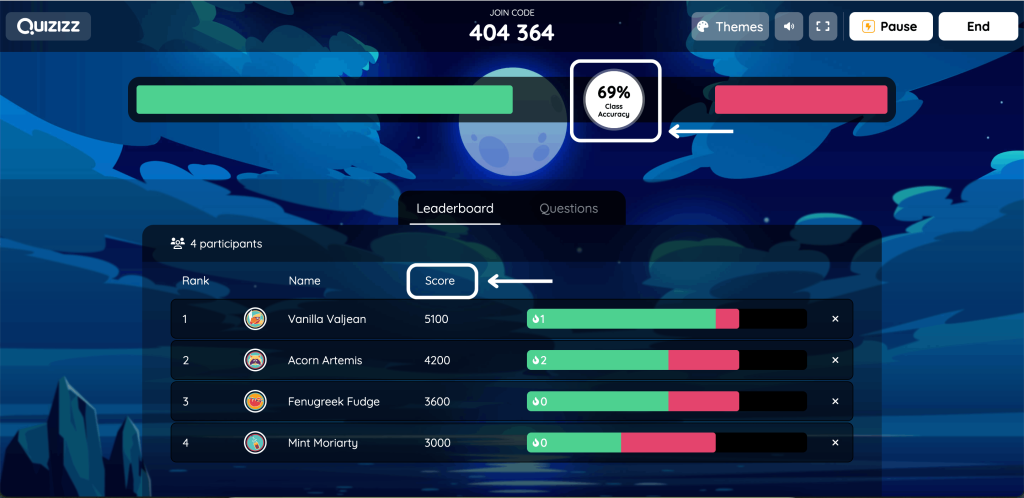
Image source: Wayground
I first came across Wayground when it was still called Quizizz, and what immediately captured my attention was its design that respects the individual pace of learners. In a live classroom setting, students naturally progress through questions at different speeds, and Wayground effectively manages this variability.
I discovered that the content library is remarkably comprehensive, containing millions of quizzes already created by educators worldwide. I have the option to build entirely new quizzes from scratch or adapt existing content that spans every relevant grade level and subject.
This ClassMarker alternative is functional in two primary ways: for live games (where questions display on a central screen and participants answer on their devices) and for asynchronous homework-mode quizzes, which students finish on their own timetable.
The reporting dashboard supplies detailed, question-level analytics. Teachers can gain insights into which questions were most often missed, how each student responded to specific items, and how the class is progressing over a period of time.
Pros:
- Self-paced mode lets students progress through questions without pressure, while still keeping them motivated.
- Millions of ready-to-use quizzes created by other teachers, which can save prep time or inspire new ideas.
- Supports a variety of question types (multiple choice, open-ended, polls, fill-in-the-blank, etc.).
- Can be used for both live, competitive games in class and student-paced assignments for homework or remote learning.
- Analytics include item-level insights and performance trends over time, helping identify concepts that need reinforcement.
Cons:
- The interface can feel a bit crowded or overwhelming for first-time users (both teachers and students may need a short onboarding).
- Primarily focused on formative assessment and practice; it’s less suited for high-stakes or proctored exams.
How Wayground Compares to ClassMarker:
Wayground provides a level of student engagement and insight that ClassMarker’s traditional approach doesn’t match. While ClassMarker has you create each test and doesn’t offer a repository of content, Wayground gives you access to an enormous library of quizzes and a fun, game-like environment.
Pricing: Offers a free plan with access to basic features. Paid plans for schools and districts are available upon request. For businesses, pricing starts at $75.
User Rating: 4.8/5 (Capterra)
7. Pear Assessment (Formerly Edulastic) — Best for Standards-Aligned Classroom Assessments
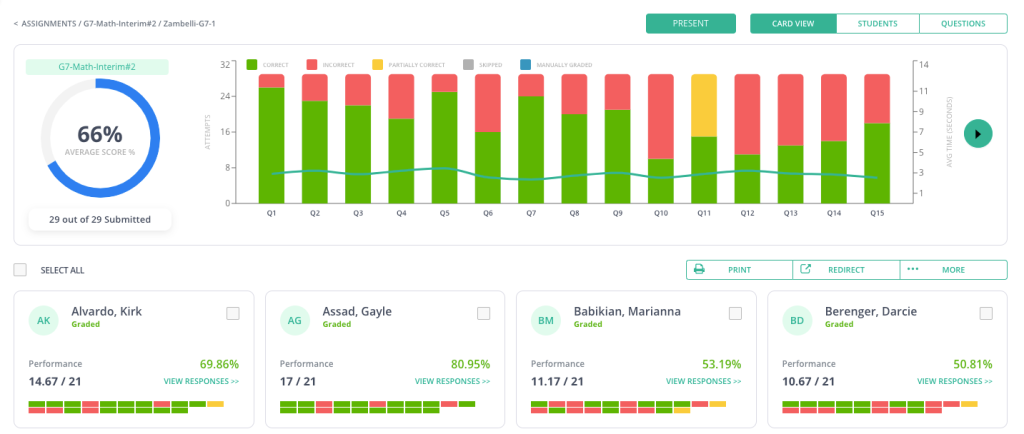
Image source: Pear Deck Learning
Pear Assessment, which many teachers still call Edulastic, is a favored platform in K–12 classrooms for creating quizzes and tests tied to educational standards like Common Core. The platform’s collection of pre-made question banks makes building quizzes fast, and it supports many question types, such as drag-and-drop, graph plotting, and free-response.
In my experience exploring Pear, the live dashboard is what makes it unique. As students take a quiz, I can watch their answers appear in real time. This means right after the class finishes a question, I can see which items were missed often or which students might be struggling.
Pear Assessment also connects easily with Google Classroom and other learning management systems, which makes assigning quizzes and syncing grades simpler. It includes helpful features like text-to-speech and a built-in math equation editor for complex formulas.
Pros:
- Extensive library of standards-aligned questions and templates.
- Real-time dashboard that shows student responses question-by-question.
- Supports multimedia and interactive question types (like graphing questions for math, passage-based questions for ELA, etc.).
- Integrates with Google Classroom and other LMS platforms, making it easy to assign quizzes and import student rosters.
- Accessibility features (text-to-speech, font adjustments) ensure all students can participate in online assessments.
Cons:
- Occasionally, I’ve heard of minor loading or lag issues on school networks with heavy firewalls.
- It’s more of a traditional test feel, which might not engage students who thrive on competition.
How Pear Assessment Compares to ClassMarker:
ClassMarker doesn’t provide in-the-moment visibility into student performance. Pear Assessment focuses heavily on real-time insight and standards alignment, making it a better fit for everyday classroom assessments where a teacher wants to gauge understanding and adjust instruction on the fly. For educators needing to track standards mastery and give immediate feedback, Pear offers a far richer toolset.
Pricing: Free basic plan for teachers, which includes creating assignments and accessing the item library. Premium plans for schools or districts start at about $125/year.
User Rating: 4.3/5 (Capterra)
8. Classtime — Best for Collaborative Classroom Quizzes
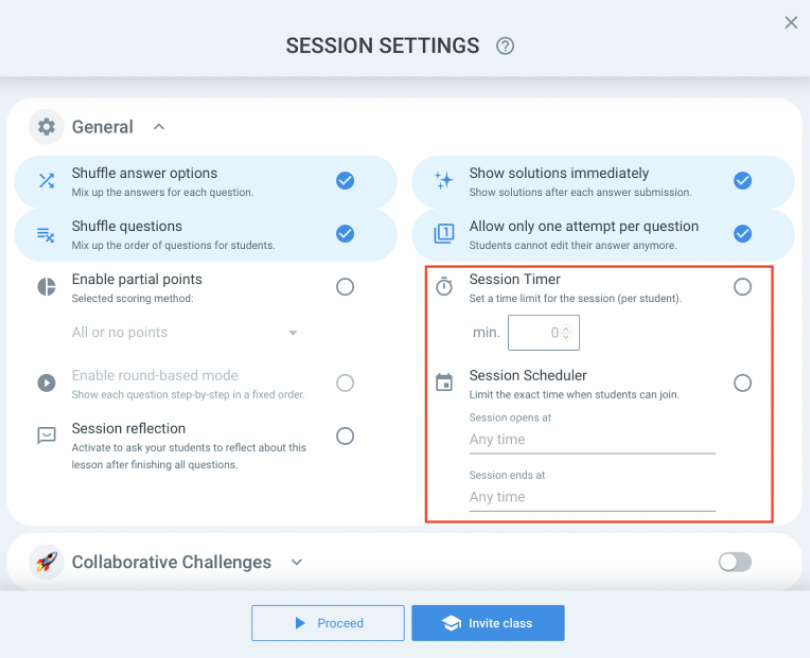
Image source: Classtime
Classtime complements in-person teaching with immediate feedback and unique collaborative features. It allows teachers to create quizzes using nine different question types and includes a public library of curriculum-aligned questions to build from.
One of Classtime’s most notable features is its Collaborative Challenges. These are essentially class-wide puzzle activities. For example, the class might collectively solve a fictional problem, with each student’s correct answer contributing to the progress. I’ve tried one where each question students answered helped “resupply a space station” in the narrative — it was a fun twist that turned a standard quiz into a team effort.
The teacher’s dashboard in this ClassMarker alternative lets you see each student’s answers update in real time. It’s similar to Pear Assessment in that it provides immediate insights. After the session, you can download results or view analytics that break down performance by question or by learning standard.
Pros:
- Collaborative Challenges turn quizzes into a group activity, which can increase teamwork among students.
- Real-time dashboard for teachers to monitor each student’s answers and overall class performance.
- Nine different question types, including more interactive ones like categorization or sorting.
- Large public question bank and the ability to share or import questions.
- Instant grading and feedback for students on objective questions, with options to allow answer revisions or explanations.
Cons:
- Importing questions from other systems (like converting a Moodle or Google Form quiz into Classtime) isn’t seamless.
- While it has some gamified aspects, the overall interface is still fairly straightforward. It doesn’t have the flashy game elements of tools like Kahoot, which some students might expect in a “fun” quiz tool.
How Classtime Compares to ClassMarker:
Classtime is built for the daily routines of classroom instruction, whereas ClassMarker is built for delivering exams. Classtime gives teachers live feedback and fun group exercises that make quizzes feel like a seamless part of a lesson. If your focus is on formative assessment, quick checks for understanding, or collaborative learning, Classtime provides a richer, more interactive experience than ClassMarker.
Pricing: Free plan with basic features. Paid plans for schools start at around $5 per teacher per month, which unlock the collaborative gamification features.
User Rating: 4.7/5 (Capterra)
9. Google Forms — Best for Free Basic Quizzes & Surveys
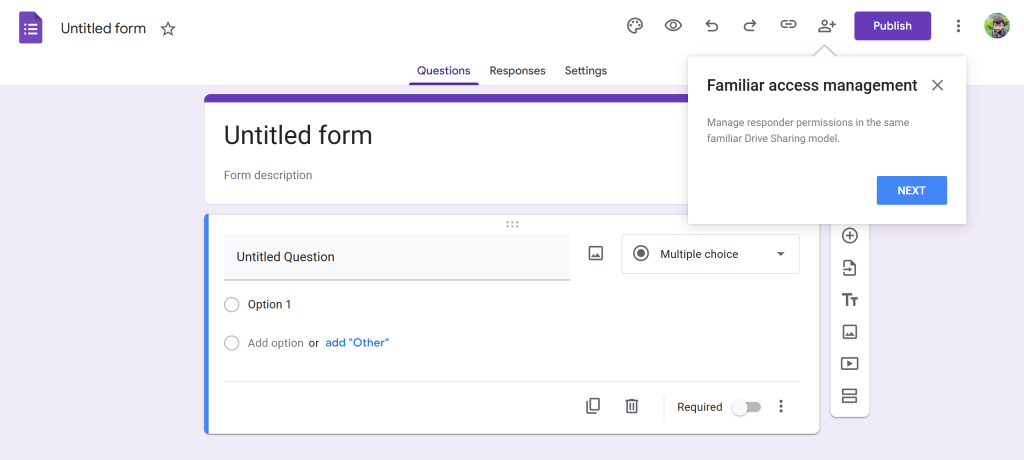
Google Forms is not a dedicated quiz platform like others on this list, but it’s often the starting point for anyone who needs a quick way to collect responses online. I’ve used this free ClassMarker alternative for everything from simple chapter quizzes to event registration and surveys. Its appeal is in its simplicity and the fact that it’s completely free to use for anyone with a Google account.
Setting up a quiz in Google Forms is straightforward: you choose “Quiz” mode, which lets you assign point values to questions and set correct answers for auto-grading multiple-choice or checkbox questions.
You can add various question types, include images or videos, and even split the form into sections. Most students and employees are familiar with it, so there’s virtually no learning curve to take a quiz on Google Forms.
Pros:
- Completely free to use for unlimited forms, questions, and respondents – no budget needed at all.
- Incredibly easy to set up and share (send a link or email invite; it works on any device with a web browser).
- Auto-grading available for objective questions, with instant feedback if you choose to show it.
- Seamless integration with Google Sheets for viewing and analyzing results; data can be easily exported or connected to other Google Workspace apps.
- Supports images and videos in questions, which can be useful for visual or media-based questions in a quiz.
Cons:
- There’s no way to prevent cheating – no lockdown browser, no tracking of tab switching. It’s not suitable for high-stakes testing.
- Limited question variety and interactivity (no drag-and-drop, no hotspots, no advanced question types like some dedicated quiz tools have).
- Customization is minimal: aside from a header image and form theme color, you can’t deeply brand the quiz or change the layout significantly.
How Google Forms Compares to ClassMarker:
If all you need is to collect answers and grade them, Google Forms will absolutely do the job, and it’s free. It’s great for low-stakes or informal quizzes, practice homework, or surveys. ClassMarker, however, offers a more controlled environment: user management, time limits, question banks, and security measures that Google Forms simply doesn’t have.
Pricing: Free for personal use with any Google account. For business use, Google Forms is included with Google Workspace subscriptions, which start at $6 per user per month.
User Rating: 4.7/5 (Capterra)
10. Riddle — Best for Personality & Marketing Quizzes
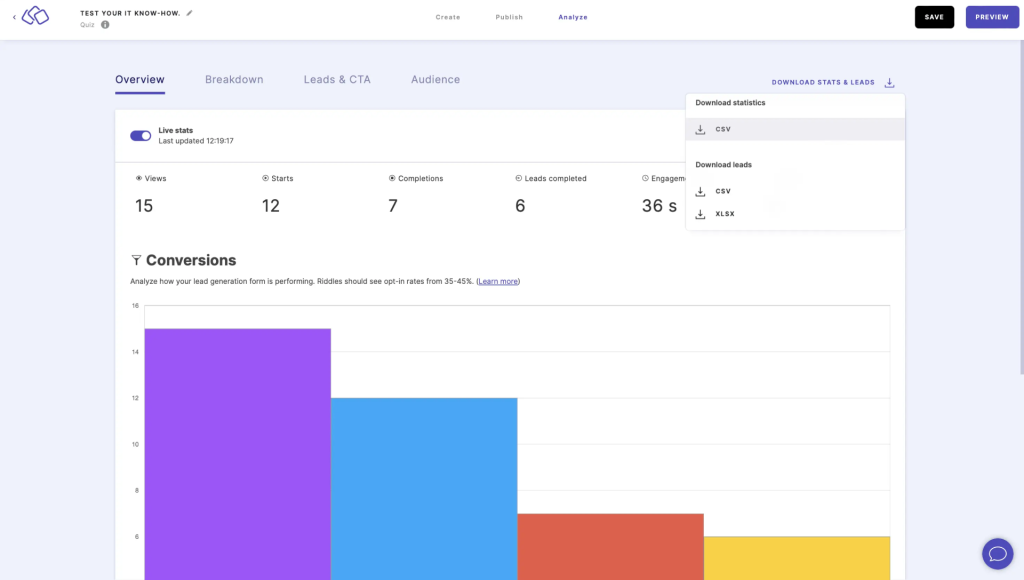
Image Source: Riddle
I first tried Riddle when I was looking for a more engaging way to capture leads on a website, and it turned out to be pretty amazing for BuzzFeed-style personality quizzes and interactive marketing content.
Riddle isn’t a traditional exam tool; instead, it shines in scenarios where you want to entertain or engage an audience and possibly collect their information (think social media quizzes, customer engagement on blogs, etc.). This ClassMarker alternative lets you create nuanced personality assessments, product recommenders, or scored surveys that feel personalized.
The platform also offers 75+ design customization options and supports 60+ languages, allowing you to embed quizzes that match your brand’s look and reach a global audience. I also like that you can set up quizzes to give custom feedback or follow-up questions based on what someone answered, making the experience interactive and dynamic.
Pros:
- Highly customizable quiz logic, allowing for complex personality quiz outcomes and branching questions.
- Supports rich media: images, videos, and GIFs can be included to make quizzes more visually engaging.
- Enables social sharing of quiz results with one click, which can help your quizzes go viral or drive traffic.
- Over 75 design and styling options plus CSS override, so you can tailor the look to match your brand or website.
- Easy embedding on any webpage and integrates with marketing and analytics tools for lead generation and tracking.
Cons:
- Riddle isn’t the most beginner-friendly platform – the interface for setting up complex logic can have a learning curve.
- Lacks features for formal education or training use (no gradebook, student tracking, or anti-cheating measures), so it’s not suitable if you need a quiz tool for assessments.
How Riddle Compares to ClassMarker:
Riddle is about engaging an audience and often capturing data in a fun way. If you’re an educator or trainer looking for a quiz tool, Riddle likely isn’t your first choice. But if you’re in marketing, content creation, or even an educator wanting to create playful quizzes for your class, Riddle offers flexibility and interactivity that ClassMarker doesn’t even attempt.
Pricing: No free plan. Paid plans start at $59/month for basic features.
User Rating: 4.8/5 (Capterra)
How to Choose a ClassMarker Alternative
When comparing ClassMarker alternatives, focus on the criteria that make a tool effective and sustainable for your needs, not just what’s flashy in a demo.
Insights from real user reviews on platforms like Capterra can be especially helpful because they reveal how these tools perform in actual classrooms and training programs. Here are some key factors to consider:
1. Ease of Creation:
Look for platforms that reduce your quiz creation time through templates, question libraries, or automation. For example, ProProfs Quiz Maker can use AI to generate quizzes in seconds from your content. The easier it is to create or import questions, the more time you can spend on teaching or analysis.
2. Variety of Question Types:
A good tool goes beyond the basics of true/false and multiple-choice. Support for matching quizzes, drag-and-drop ordering, hotspot images, fill-in-the-blanks, polling, or audio/video-based questions will let you create more engaging and effective assessments.
3. Analytics and Reporting:
Robust ClassMarker alternatives provide detailed insights into performance. If you need to track progress or identify trends, look for tools that let you drill down to individual question results and see class performance over time. For instance, some tools show which questions were hardest or let you tag questions by topic and report on those.
4. Accessibility and Logistics:
Make sure it’s easy for your learners to access the quiz. Some tools let students join via simple game codes or links – great for a quick trivia round in class – while others integrate with LMS platforms or allow single sign-on, which is better for formal training where you want to track user identities.
Also consider device compatibility (most are web-based, but if your students only have phones, a tool with a good mobile app or responsive design is crucial). The fewer barriers to entry, the smoother your test session will go.
5. Security and Integrity:
If you’re doing high-stakes exams or certifications, features like question randomization, time limits, answer shuffling, IP restrictions, browser lockdown, or even video proctoring can be critical. Not all platforms offer these, so narrow your choices based on the level of security you need. You don’t want to use a fun, loose tool for something that requires rigor (or vice versa).
By evaluating ClassMarker alternatives against these factors, you’ll get a clearer sense of which one fits your specific needs best.
Whenever possible, start with a short trial or a free version and actually run a test quiz with it. It’s the simplest way to see if a platform delivers the balance of ease, engagement, and insight that you’re looking for.
My Top 3 Picks for ClassMarker Alternatives
From my comparisons, three tools emerged as the strongest ClassMarker alternatives:
1. ProProfs Quiz Maker:
ProProfs combines ease of use with powerful features like AI-generated quizzes and enterprise-level security. It works equally well for quick classroom quizzes and formal, proctored exams. With 20+ question types and detailed analytics, it offers a versatility that covers both educational and corporate needs.
2. Exam.net
Exam.net is built for exam integrity. Its lockdown browser and live monitoring tools make it ideal for high-stakes academic testing or certification exams. It provides the kind of controlled environment and subject-specific tools (e.g., math editors, dictionaries) that ensure fairness and accommodate various exam content.
3. Pear Assessment (Edulastic)
Pear Assessment stands out for real-time insights and standards alignment. It transforms quizzes into interactive learning experiences by showing results instantly and helping teachers pinpoint misunderstandings on the spot. For K–12 teachers who need to align to curriculum standards and intervene quickly, Pear makes assessments a seamless extension of teaching.
FREE. All Features. FOREVER!
Try our Forever FREE account with all premium features!
Elevate Your Assessments Beyond ClassMarker
The real takeaway from exploring ClassMarker and its competitors is how many strong alternatives are available today. Some prioritize live engagement and fun, others emphasize strict exam security, and several leverage AI and analytics to save prep time and improve learning outcomes. The range of options is far broader than it was a few years ago.
The key is to match the platform with your specific goals—be it compliance testing, classroom formative assessment, or interactive training quizzes. By choosing the right fit, you turn assessments from mere tasks into valuable tools for insight and improvement.
Don’t be afraid to pilot a couple of them and see which one resonates with you and your learners. Selecting smarter tools will ultimately strengthen your assessments – and that means better results for everyone involved.
Which ClassMarker alternatives offer stronger cheating prevention?
If security is your top priority, Testportal, ProProfs Quiz Maker, and Exam.net provide advanced measures like browser lockdowns, webcam proctoring, access codes, and time tracking. These tools are often used for compliance training or certification exams where monitoring integrity is critical.
What are the best ClassMarker alternatives for classroom use?
For interactive and student-friendly environments, Wayground (formerly Quizizz) and Pear Assessment work best. They focus on engagement through real-time dashboards, self-paced quizzes, and standards-aligned content. Teachers often prefer these over ClassMarker because they make assessments more dynamic and less formal.
Are there free ClassMarker alternatives worth trying?
Yes. ProProfs Quiz Maker, Google Forms, and Kahoot! all offer strong free plans. ProProfs lets you create short quizzes with AI assistance and most features, Google Forms is ideal for quick assessments, and Kahoot! supports live competition.
Which ClassMarker alternatives offer deeper analytics?
Tools like ProProfs Quiz Maker and Testportal go beyond basic scoring. They show time spent per question, topic-level breakdowns, and performance trends over time. This level of insight helps instructors and HR teams identify skill gaps and adjust training content.

 We'd love your feedback!
We'd love your feedback! Thanks for your feedback!
Thanks for your feedback!


